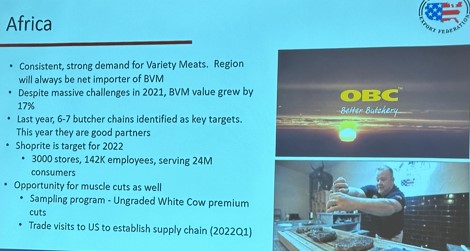
Senior Farm and Ranch Broadcaster, Ron Hays, got the chance to visit with Matt Copeland, U.S. Meat Export Federation representative in Africa. Copeland talks about his involvement with USMEF over the last several years.
“It is a wonderful privilege to represent the USMEF in Africa,” Copeland said.
Copeland is responsible for all countries in Africa aside from Egypt.
“A lot of what we do is building a base that we can trust,” Copeland said.
The main goal of Copeland’s work, he said, is making sure that U.S. meat products are making it onto as many tables as possible in Africa. Part of this process, he said, involves analysis of how to prove that U.S. meat items are of more value than competitors from other countries.
“That is really just a protein deficiency in Africa that we are trying to balance,” Copeland said. “To go one step further, obviously, we have wonderful manufacturing processors in the country who can make incredible bacons, beef burgers with U.S products in-country, and then from there, we can probably go up to maybe differentiating on intensely grain-fed animals.”

Copeland also talked about a USDA mission in Kenya he took part in recently.
“It was the first time that agri-trade mission had gone into Kenya,” Copeland said. “I will say, my two biggest takeaways from there were we always think that food security is a long way off and managing logistics to an end consumer in rural third-world Africa has always seemed like a task that we probably wouldn’t solve.”
On the contrary, Copeland said through the trade mission, he saw many possibilities for Kenyans to gain access to resources they have had trouble accessing in the past.
“Firsthand, I experienced a company called Copia, and what they are doing is quite incredible,” Copeland said. “They have 1.5 million users on their platform, they are processing about 40,000 orders a day, and they are delivering to 38,000 selling points in rural Kenya. What that means is you are empowering a Kenyan workforce to not have to worry about having to go and fetch or take time out of their day to go use substandard routes in terms of transport, but they can actually give themselves to their careers.”
This experience, Copeland said, is proof that there is potential for more accessibility through meat export as well. Delivery convenience bringing food security closer to Kenyans was moving, he added.
Click the listen bar above the story to listen to Ron’s full interview with USMEF’s Matt Copeland.















